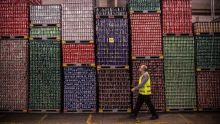Support for the Turnbull government has crashed, according to the latest Fairfax-Ipsos poll, and Labor now holds a thumping 10-point lead over the Coalition in the two-party preferred vote.
Under a uniform swing, if an election had been held on Saturday, the government would have suffered an electoral drubbing and lost 24 seats, including cabinet ministers Peter Dutton and Christian Porter, as well as junior ministers Ken Wyatt and Luke Hartsuyker.
More National News Videos
We're backing families: PM
The Turnbull government is celebrating thre passage of its childcare changes through the Senate, saying it's a win for parents who want to get back into the workforce. Courtesy ABC News 24.
The poll will likely send shockwaves through the government, which believed it had started to recover politically after a series of policy announcements designed to tackle rising power prices, and may kick off a fresh discussion about the Coalition's prospects under the leadership of Prime Minister Malcolm Turnbull.
It comes ahead of the final sitting of Parliament before the May budget, and after a week in which the government announced controversial changes to race hate laws, passed a $1.6 billion childcare package, and explicitly backed a cut to Sunday penalty rates.

The Coalition now trails Labor on a two-party preferred basis by 55 per cent to 45 per cent, while strong support for minor parties, including the Greens, One Nation and the Nick Xenophon Team, has held firm.
The two-party preferred vote is a big dip since the July 2016 election result, when the Coalition narrowly won by 50.4 per cent to 49.6 per cent. In November's Fairfax-Ipsos poll, Labor led the Coalition 51-49.
Significantly, the 55-45 lead for the opposition is worse than the 54-46 two-party result recorded in August 2015, weeks before Tony Abbott was removed as leader by Mr Turnbull. It is only two percentage points better than Mr Abbott's worst ever Fairfax-Ipsos result, 56-44, which came soon after the disastrous May 2014 budget.
Mr Turnbull's personal approval rating has also gone backwards since November, falling 5 points to 40 per cent, while his disapproval rating has risen 3 points to 48 per cent. In October 2015, soon after becoming leader, Mr Turnbull's approval was 28 points higher, at 68 per cent, and his disapproval rating was 17 per cent.
Opposition Leader Bill Shorten's approval also fell 2 points to 35 per cent, while disapproval remained steady at 53 per cent.
"He's a can-do prime minister," she said, "He's got a vision for this country, he's got a lot of issues to deal with but he's performing strongly and he will retain the support of the vast majority of the party room in order to lead us to the next election."
She also dismissed as "fake news" a report that Defence Minister Marise Payne could be sent to New York as Consul-General, and denied Attorney-General George Brandis was headed to the High Commissioner's post in London.
Similarly, Mr Turnbull still leads Mr Shorten as preferred prime minister, but the gap between the two men has narrowed to 45-33, a 12-point lead for Mr Turnbull. In November, Mr Turnbull's lead was 51-30, a 21-point lead.
In comparison, Mr Shorten led Mr Abbott as preferred prime minister 45-39 in the August 2015 poll. Mr Abbott's net approval at that time was minus 24, a far worse result than that recorded by Mr Turnbull.
A vote on the government's $50 billion, 10-year plan to cut company taxes from 30 per cent to 25 per cent is expected in the Senate this week, and looks likely to be defeated.
At this stage, the most likely outcome is that the Senate crossbench will agree to cut the tax rate to 27.5 per cent for companies with a turnover of up to $10 million.
Both major parties' primary vote has fallen since the election, but the slump has been worse for the Turnbull government. In July 2016, the Coalition's primary vote was 42 per cent; that fell to 36 per cent in November and has now slipped to just 33 per cent. Labor's primary vote at the election was 35 per cent, and fell to 30 per cent in November. It has rebounded to 34 per cent.
Voters' apparent dissatisfaction with the major parties has translated into strong support for the Greens, who recorded a primary vote of 16 per cent, up from 10 per cent at the election, and "other" parties, including Pauline Hanson's One Nation and the Nick Xenophon Team, which recorded a primary vote of 17 per cent, down one point since November but up four points since the last election.
The nationwide poll of 1400 people was conducted from Wednesday to Saturday and has a margin of error of 2.6 per cent















